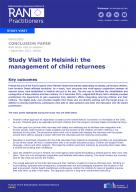Details
- Publication date
- 21 March 2022
- Author
- Directorate-General for Migration and Home Affairs
- RAN Publications Topic
- Foreign Terrorist Fighters and their families
Description
Finland was one of the first European Union Member States that started repatriating its citizens, particularly children, from formerly Daesh-affiliated territories. As a result, local structures and multi-agency cooperation between all relevant actors were established in Helsinki and put to the test. The aim was to facilitate the rehabilitation and reintegration of these children and their mothers.
On 1 December 2021, a digital RAN Study Visit to Helsinki provided practitioners the opportunity to gain experience from Helsinki’s efforts integrating returning children and their mothers. The digital study visit provided insights from those who are directly working with the target group. In addition to sharing experiences, participants were able to raise questions and enter into discussion with the expert practitioners.
The main points highlighted during the study visit are listed below.
- Finland’s overall approach to repatriation is based on the United Nations Convention on the Rights of the Child. As such, Finland’s goal is to repatriate all Finnish children from the camps in formerly Deash-controlled territory.
- The main goal is to provide child returnees with safety and wellbeing and to facilitate their integration into Finnish society. Safe housing is made available and the location of the children and their mothers is not disclosed to the public. The preventive police work unit is tasked with keeping the returnees and the people around them safe by staying in touch with both the returnees and the receiving communities.
- Education is prioritised. Education for the child returnees from Helsinki is conducted remotely (via smartphones) at one of the camps (Al-Hol) in collaboration with a non-public education project. Children are taught Finnish language, culture and other subjects. This helps the children (and their mothers) by providing them basic skills, a routine and building their confidence.
- Upon the children’s arrival in Finland, the multi-agency team starts formulating a shared goal for their work with them. Their aim is to strengthen cooperation and facilitate information sharing. Two social workers are involved. One for the child and one for the mother.
- The overall approach to the child returnees and their mothers is based on trauma-informed work. Working on trust building, openness and transparency, empowerment and acknowledging someone’s life situation in the past and present. Mental health practitioners continuously monitor the children for signs of possible traumas that may show up after a few years. This approach calls for a long-term commitment and policy.
This paper summarises the main insights gained about Helsinki’s management of child returnees, describing the multi-agency cooperation in a chronological order. This is followed up by recommendations from the practitioners from Helsinki to their colleagues from different Member States. Follow-up and inspiring practices are also presented.

